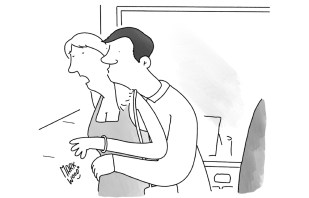Three-and-a-half miles south-west of Nuremberg in the small town of Stein stands the Schloss Faber-Castell, a 19th-century neo-Renaissance castle built for a dynasty of pencil manufacturers. In October 1945 it became home to hundreds of reporters who were covering the trial of 21 high-ranking Nazis, including Hermann Göring, Rudolph Hess, Joachim von Ribbentrop, Alfred Rosenberg, Julius Streicher and Albert Speer, with Martin Bormann being tried in absentia.
Alfred Döblin offered a first-
hand account of the courtroom in which he never set foot
Prominent among the reporters were internationally celebrated writers such as John Dos Passos, Rebecca West, Elsa Triolet, Erika Mann and Erich Kästner, as well as the future German chancellor Willy Brandt, who returned from a 12-year exile in Norway as a correspondent for Oslo’s daily newspaper, Arbeiderbladet. As Uwe Neumahr remarks in the foreword to this fascinating account of the ‘press camp’: ‘Never before and never since had so many famous writers from all over the world come together as during this “zero hour”.’
Unlike such books as Richard Davenport-Hines’s A Night at the Majestic,about the 1922 dinner attended by Proust, Joyce, Stravinsky, Diaghilev and Picasso, or Sherill Tippins’s February House, about the Brooklyn home shared by Auden, Britten, Carson McCullers, Paul and Jane Bowles and Gypsy Rose Lee, this is not an account of the interrelationships of the various luminaries. Indeed, with rare exceptions such as Martha Gellhorn’s wariness of West (understandable, given her affair with West’s former lover, H.G. Wells), Neumahr eschews their encounters, to focus on their individual lives, past histories and attitudes to Germany, Nazism and the trial.
The occupation forces were determined that the trial, the first of its kind to indict the leaders of a criminal regime, should be an act of justice, not vengeance. The defendants were arraigned on four charges: crimes against peace; war crimes; crimes against humanity; and conspiracy to commit those crimes. Nuremberg itself, the seat of Hitler’s infamous rallies, was a powerfully symbolic setting, although the trial didn’t escape controversy. American correspondents queried its legality; Jews claimed that the horrors of the Holocaust were marginalised; and Brandt, among others, questioned the absence of German judges to hold the defendants accountable for crimes against the German people.
The protracted proceedings were often tedious, leading many correspondents to sensationalise and even invent incidents both inside and outside the courtroom to meet their editors’ demands. Examples include the detonation of an unexploded bomb in the city being described as a terrorist attack; a reporter claiming to have stumbled on not only Dos Passos but Hemingway and Steinbeck (neither of whom was present) in the castle bathroom; and, most egregiously, the US military news-paper, Stars and Stripes, publishing a headline based on a false report that the Soviet prosecutor had shot Göring in court after the former Reichsmarschall insulted Stalin.
Even the eminent writers under scrutiny here were not averse to mixing fact with fiction. Just as Dos Passos incorporated documentary material in his novels, so he smuggled invented accounts into his reportage, putting his own views into the mouths of anonymous captains, lieutenants and eyewitnesses. Kästner sketched an imaginary conversation in the courthouse foyer about the celebrities to be seen amid ‘all the funfair buzz of activity’. Triolet composed collage articles with a touch of surrealism. Meanwhile, Alfred Döblin, the author of Berlin Alexanderplatz, offered a first-hand account of the courtroom in which he never set foot.

Although heavily outnumbered by their male counterparts and housed in a separate villa in the castle complex, the women writers were among the most distinguished at the trial. Neumahr includes rich anecdotal accounts of Triolet, the French Stalinist with a taste for high living and distaste for the spectacle of off-duty judges at play; Mann, attending with her journalist lover Betty Knox (formerly, one-third of the music hall act Wilson, Keppel and Betty); Gellhorn, patronisingly described by her editors as their ‘girl correspondent’, holding that the entire German race should be exterminated. Most engrossing of all is the portrait of West, whose reports ‘thoroughly sexualised the Nuremberg Trial’, while she herself enjoyed a passionate affair with the chief US judge, Francis Biddle.
Neumahr explores controversies over the legality of the trial, the composition of the court and the justice of its verdicts. In a compelling coda, he describes how Golo Mann, who took the polar opposite view of Germany’s collective guilt to his sister Erika, pleaded for Rudolph Hess’s release from Spandau Prison from the late 1960s onwards. His belief that Hess, who extolled Hitler’s greatness to his dying breath, was ‘a most deeply harmless human being’ with ‘nothing at all evil about him’, illustrates how even an exiled German could fall prey to the Nazi myth, to which the trial and its reporting, however flawed, was such a vital corrective.







Comments